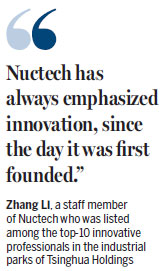Nuctech shaping capital's high-tech industry landscape
Nuctech in Beijing showed China's strength in advanced manufacturing during the 2016 Rio Olympics in August through its security inspection system, reducing inspection time by two-thirds when compared with human operation.
The FS6000 container/vehicle rapid inspection system is frequently used in exit and entry ports, highways and bonded areas to inspect empty containers, cargo and interlayers, said Chen Yongjian, general manager of Nuctech's Brazilian branch.
"In the past, it took about three hours for customs staff to open and check 200 containers one-by-one," Chen said. "Now this task can be done by our device within an hour and machines don't require breaks throughout the day."
During the Rio Olympic Games, the company took charge of 75 percent of security inspections by sending about 260 luggage and large cargo inspection systems to the Olympic village and four major competition areas, he said.
Experts from Tsinghua University helped the company to design a new kind of accelerator that can deliver X-ray imaging with different energy, avoid affecting the cab and identify the dangerous goods that may be hidden in containers, such as drugs, explosives and nuclear materials.

"Drivers don't have to stop their trucks or open the containers to get them checked," Chen said. "The device can inspect containers moving at a speed of 15 to 30 kilometers per hour, which has significantly improved efficiency."
The 20-year-old company is subordinate to Tsinghua Holdings, a State-owned group based on the human resources and scientific strength of Tsinghua University. Nuctech mainly focuses on the research and development of security inspectors, alarm systems and identification devices.
Li Zhijun, deputy CEO of Nuctech, said the company was built to answer the nation's call for the development of the manufacturing industry.
China Customs bought two inspection machines developed by the United Kingdom and Germany to resolve the urgent problem of smuggling in 1995, with a unit price of more than 100 million yuan ($14.37 million), Li said.
"Nuctech was born with the goal of producing large container inspection devices with better quality and lower prices than our foreign counterparts'," Li said. "Two years later, Nuctech began producing made-in-China inspection devices, which only cost about one-third of its foreign peers'."
Cheng Wei, deputy director of the CEO's office at Nuctech, said its products defeated competitors from the United States and Germany when bidding for Dubai's customs in 2002.
"The US device failed to complete the test because it couldn't bare the high temperature. Interestingly, although the containers successfully passed through the German device, the warning alarm rang when they passed through Chinese one," Cheng said. "They then opened the containers and found interlayers loaded with smuggled articles."
The company has exported its products to more than 140 countries and regions, including 85 percent of European countries. In America, Nuctech products took a 50 percent market share.
In addition to the 2016 Rio Olympic Games, Nuctech also provided security services for the 2008 Beijing Olympic Games, the 2014 FIFA World Cup Brazil and the 2016 Boao Forum for Asia.
Three members of the company's staff were listed among the top-10 innovative professionals in the industrial parks of Tsinghua Holdings, after an election held from May to August based on the result of online voting and the opinions of an expert panel.
One of the professionals, Liu Yaohong, executive vice-president of Nuctech's United Research Institute, invented the world's first portable container/vehicle inspection system, helping to detect two tons of drugs hidden in containers of coffee beans in Amsterdam, the Netherlands, in early 2007.
"Our devices can tell the difference between ingredients for drugs and coffee beans, and identify them with different colors on the computer," Liu said.
The company invests 200 million yuan in technological research annually and employees can submit their new ideas to the company's technological committee to get research funding, Liu said.
Zhang Li, who won the highest score in the selection, developed a computer tomography liquid security inspection system, helping to detect dangerous liquids in airports. The system has been sold to 10 European countries, generating about 200 million yuan in total sales.
"Nuctech has always emphasized innovation, since the day it was first founded," Zhang said.
chenmeiling@chinadaily.com.cn
(China Daily 12/20/2016 page12)














